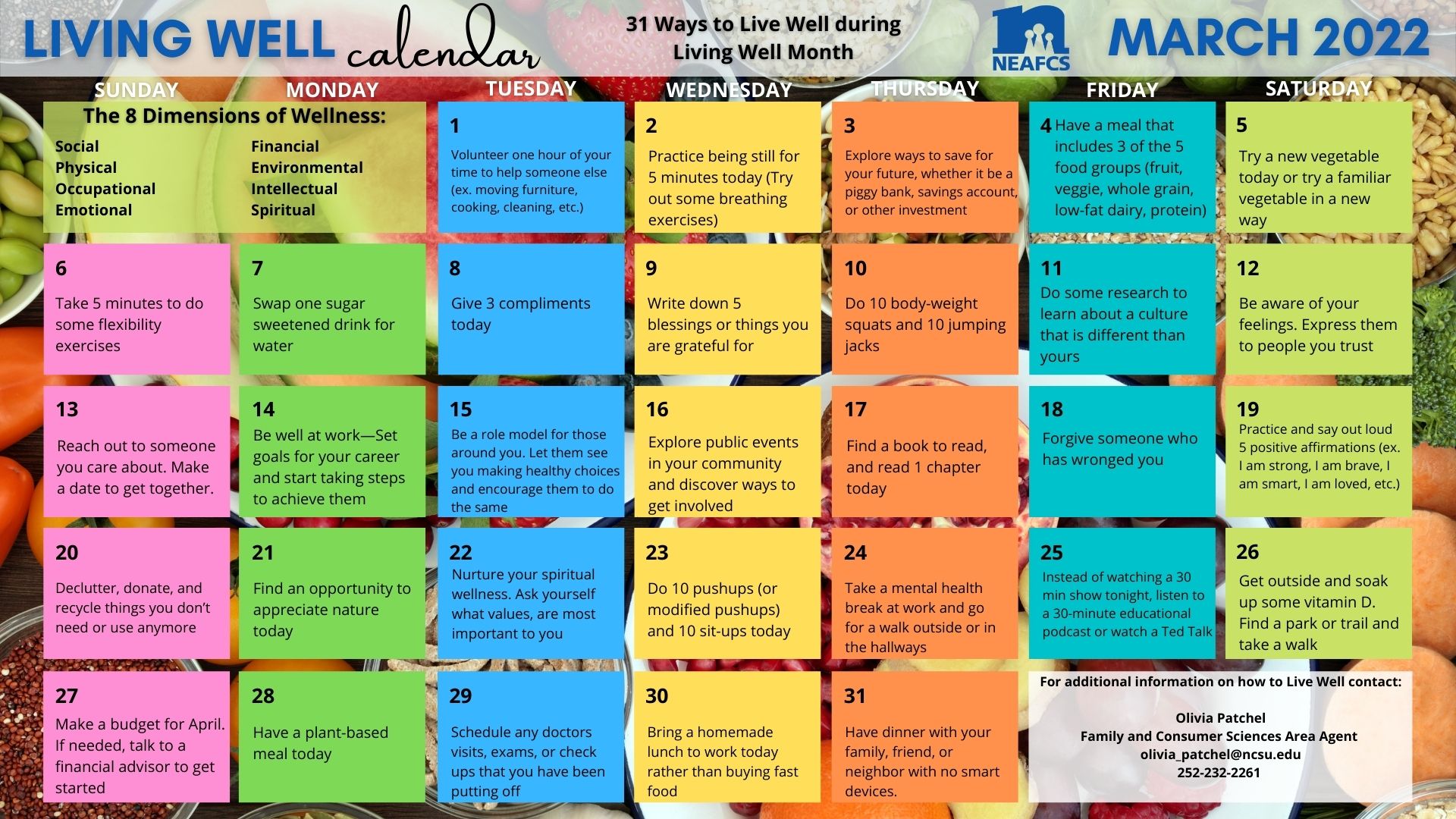March Is Living Well Month
go.ncsu.edu/readext?852049
en Español / em Português
El inglés es el idioma de control de esta página. En la medida en que haya algún conflicto entre la traducción al inglés y la traducción, el inglés prevalece.
Al hacer clic en el enlace de traducción se activa un servicio de traducción gratuito para convertir la página al español. Al igual que con cualquier traducción por Internet, la conversión no es sensible al contexto y puede que no traduzca el texto en su significado original. NC State Extension no garantiza la exactitud del texto traducido. Por favor, tenga en cuenta que algunas aplicaciones y/o servicios pueden no funcionar como se espera cuando se traducen.
Português
Inglês é o idioma de controle desta página. Na medida que haja algum conflito entre o texto original em Inglês e a tradução, o Inglês prevalece.
Ao clicar no link de tradução, um serviço gratuito de tradução será ativado para converter a página para o Português. Como em qualquer tradução pela internet, a conversão não é sensivel ao contexto e pode não ocorrer a tradução para o significado orginal. O serviço de Extensão da Carolina do Norte (NC State Extension) não garante a exatidão do texto traduzido. Por favor, observe que algumas funções ou serviços podem não funcionar como esperado após a tradução.
English
English is the controlling language of this page. To the extent there is any conflict between the English text and the translation, English controls.
Clicking on the translation link activates a free translation service to convert the page to Spanish. As with any Internet translation, the conversion is not context-sensitive and may not translate the text to its original meaning. NC State Extension does not guarantee the accuracy of the translated text. Please note that some applications and/or services may not function as expected when translated.
Collapse ▲N.C. Cooperative Extension FCS Professionals Help Area Residents to “Live Well”
Health is a lot more than how one looks and feels. Conversations about health should include all eight dimensions or areas of wellness—that is mental, social, emotional, spiritual, financial, occupational, environmental, and intellectual. That’s the focus of Living Well Month, a national event in March promoting overall wellness and the education provided by Family and Consumer Sciences professionals to improve the lives of people, families, and communities.
“The North Carolina Extension Association of Family and Consumer Sciences works through the NC Cooperative Extension Service to offer information that will help families achieve a positive, healthy lifestyle,” says Olivia Patchel, Family and Consumer Sciences Area Agent serving Currituck and Camden Counties. Whether you are trying to manage your diabetes through meal planning and exercise, make decisions about health care and insurance, or get tips on effective parenting techniques, Extension FCS has a research-based answer.
To make every month a “Living Well Month,” consider these tips:
- Engage children in at least 60 minutes of physical activity on most days of the week. Adults need at least 30 minutes of physical activity. Play sports or recreational games, turn on some music and dance, hula hoop, or make an obstacle course. Take a walk or a bike ride in your neighborhood. All movement counts.
- Start planning a garden now to work in the spring and summer. Gardening is great physical activity. This activity could also nurture your mental and environmental wellness.
- Rethink your drink. The average adult human body is approximately 60 percent water. Water regulates every living cell’s processes and chemical reactions. It transports nutrients and oxygen. Water also helps to maintain normal bowel habits and prevent constipation. Reduce the amount of soda and fruit drinks consumed daily.
- Eat a variety of healthful foods. Eat colorful fruits and vegetables every day. Most people need to increase their fruit and vegetable intake. Have a sliced banana on cereal for breakfast. Enjoy a sandwich loaded with vegetables at lunch. At dinner, steam some vegetables and prepare a fruit parfait with yogurt for dessert. Try new fruits and vegetables. If there’s a kind you don’t like, try preparing it in a different way. See www.choosemyplate.gov for more information about nutrition for yourself and members of your family.
- Read, read, read. Go to the library and check out books. Keep the mental stimulation flowing throughout the year regardless of your age. This will enhance your intellectual health.
- Talk to a friend or start a journal to get your thoughts and feelings off your chest. Staying in check with emotional health can be tough, but it’s important.
- Check out parenting, finance, nutrition, and/or food preparation classes offered by your Extension office. See go.ncsu.edu/currituckeventbrite for more information about upcoming offerings.
- Maintain a healthy home. Check that your smoke detector is working correctly and test for the presence of Radon. Help manage allergies and/or asthma by cleaning and vacuuming regularly to reduce allergy triggers in the home. Avoid accidental poisonings by keeping medications locked up and cleaning agents and other poisons out of reach of children.
- Keep your family finances in check. Track your expenses and update your budget regularly. Eat at home often because meals outside of home usually cost more. Plan your menus and use coupons as a planning tool. Creating and sticking to a budget, along with paying off debt are great first steps to financial wellness.
All eight of the dimensions or areas of wellness are connected and support each other. Evaluate your overall wellness and take small steps to improve your health during Living Well Month and all year long.
Take the March Living Well Challenge by completing the tasks on this calendar!
Do you want more information about Living Well? Contact Olivia Patchel at olivia_patchel@ncsu.edu or via phone at 252-232-2261.





